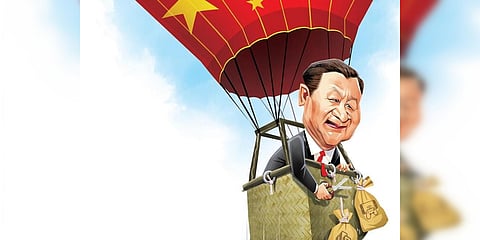

The deadline for Evergrande Group's USD 80 million interest payment on its bond holdings has come and gone without a squeak from the Shenzhen-based China real estate developer. The giant, whose model has been to borrow and build, is unable to service its gargantuan USD 305 billion debt. Though it may not be China's 'Lehman moment' just yet, Evergrande's slide into default is threatening the stability of world markets.
The immediate trigger for the crisis has been the Chinese government tightening financial laws since August 2020. These have made it virtually impossible for the real estate financier to bring in any further debt onto its books. Many see the tightening noose as deliberate as the Chinese government is keen to puncture the real estate bubble.
The expectation that Beijing may bail out Evergrande may be belied. In fact, Chinese officials are telling newspersons that "they are getting ready for a possible storm", and it points in the opposite direction.
The government in China will do nothing to save Evergrande. At best, officials have been asked to stand by and mitigate the ripple effects after China's second largest property developer sinks. There is something consistent about China's rulers' approach to some of the big success models of Chinese capitalism. They are going after all of them.
Going after the tech giants
Alibaba, the onetime competitor of Amazon that raised USD 25 billion in 2014 on the NY Stock Exchange, is today a shadow of its former self. Jack 'Daddy' Ma, revered as an icon who brought China out from the dark ages, was cut to size and branded a ‘bloodsucker’ and a violator of Chinese laws.
The IPO of Ant Group, Alibaba’s financial services arm that was to raise $35 billion last November, was nixed by government authorities hours before the trading session was to start on the Hong Kong and Shanghai stock exchanges.
More recently, on 8 September, various gaming firms including Tencent Holdings and NetEast Inc were summoned by Chinese officials and threatened they would face a crackdown if they failed to implement new rules for the sector. Ostensibly, they are to salvage the mental health of the young. But these new regulations are being seen as the state moving for increasing control over sectors that include tech, education and property.
A little over a month ago, Martin Lau, President of the tech giant Tencent Holdings, warned investors to be ready for more regulatory curbs. Tencent, China’s largest company, reported its slowest pace of quarterly revenue growth since early 2019, faced with crackdowns on the education technology sector and mobile gaming business.
What’s behind the axe?
How does one explain this seemingly irrational rush to destroy wealth, and even shut down some of the most successful Chinese tech giants. Some say it is the Chinese government’s fear of giving external investors access to these companies’ data.
An interesting hypothesis that appeared in Forbes last month said China’s President Xi Jinping is in a rush to achieve technological superiority by 2025. In this endeavour, this clutch of gaming, and financial firms like Alibaba, Tencent and ride-hailing company Didi are not of any use as they are not about core technologies. The future, the Chinese state figures, will be built on quantum computers, semiconductors and satellites, and not shopping and gaming apps.
President Xi is worried that tech creativity is not being funneled to hardcore projects such as energy, transportation and healthcare. Instead, technology is being put to use for launching mobile games and e-commerce websites that are instantly popular, offer instant returns and are favourites with the investor community.
While there is rationale in these hypothesis, the real answers lie in the hardening of political lines in the Chinese leadership under President Xi. We must remember the Chinese Communist Party (CCP) is celebrating its 100th anniversary, and there is palpable urgency in the leadership to establish purity of ideology. This includes an ultra-nationalist line of making China strong internally and an important world power externally. The formation of the Australia-UK-US axis to contain China will only reinforce this trend.
Political nationalism is spilling over into the cultural doctrine of the country. In the first week of August, the state media let lose a salvo against the 'spiritual opium' offered by games such as Tencent's popular 'Honour of Kings'. The Economic Information Daily, linked to state media agency Xinhua, said minors were addicted to mindless activity and called for curbs on the gaming industry.
As the Communist Party scrambles to establish 'Xi Jinping Thought' as the new ideology, sectors of the economy that had spun out of control from the party’s ambit, are now being pulled in.
The tech sector had given China galloping growth, but it also spawned the likes of Jack Ma as independent economic power houses. What we see now is the process of reining in the independent capitalist rogues who had grown too big and had begun to discreetly challenge the lines of state capitalism.